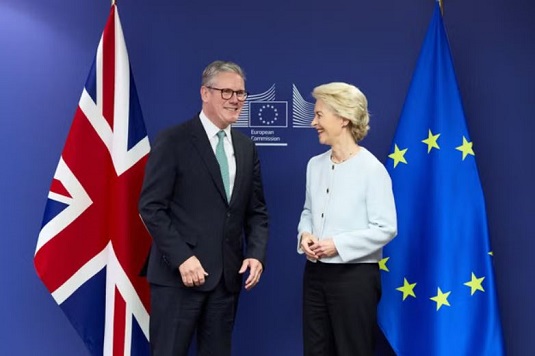
Contrary to the myths spun about the Leave vote in the nine years since the referendum, this was no working class revolt - as recent research makes plain. Those shielded by property wealth, who tended to be of pensionable age, were more likely to support Brexit because they were shielded from its risks. Thy were not the ones who would face its consequences of falling order books, barriers to trade, and uncertain business outlooks. But these layers didn't see things that way. If they thought about the fates of their children and grand children at all, they were voting for a familiar, sepia-tinged Britain of the past that evinced feelings of security and familiarity, a place where everyone knew their place. There were no strange accents and languages in the bus queue, men and women were content with their stations in life, and you could say what you wanted and be greeted with laughter, not offence. If it was good enough for them, it was good enough for their kids.
This wasn't the only reason why millions voted to leave the EU, but it's part of the emotional economy that underpinned the ugly xenophobia and racism Brexit's elite congregants whipped up with much success. As we know, Boris Johnson's decision to campaign for Brexit and lead the leave campaign was probably decisive in what was always going to be a close result, and that this was motivated by ambition more than principle. Does he think his mercifully brief stint in Number 10 was worth it? As were those sections of capital that threw their lot in with the Brexit. To be crudely reductionist about it, the divisions among commercial and financial capital - the City - more or less broke along the lines of those individuals and firms whose interests were tied to the near abroad versus those oriented further afield. But there was more to it than economics as conventionally conceived.
Since Thatcher came to office, the Tories have gradually run down the capacities of the state. Their supporters have made money from the subsidised selling off of crucial public infrastructure, and have fully colonised those bits of the public sector that remain but are forced to work "in partnership" with business. The effect of the Tory counter revolution - perfected and deepened by Tony Blair and Gordon Brown, and the Tory and Labour governments since - has been most startling on class relations themselves. After the state was used to smash up and shackle the labour movement in the 1980s, successive governments have asserted the primacy of the executive over all aspects of this sprawling apparatus. The Tory assault on expertise curbed the relative autonomy of public institutions, and the use of market mechanisms for managing the public sector and the population at large saw a gradual removal of obstacles that block government from doing what it wants to do. The authoritarian state that has always enabled and accompanied the neoliberalisation of every day life is a project for making the centre, the Prime Minister's office and their satraps, fully sovereign. They are free to manage the class relations of this country as they see fit.
Except this was not enough for the most class conscious sections of the right. Their waffle about taking back control and restoring British sovereignty was the culmination of the Thatcherite offensive. They can never be fully sovereign if the British state is bound by laws and regulations made across the Channel. There was always the implicit threat that rulings from Strasbourg and Brussels could constitutionally bind their hands. Not that EU membership prevented the horror show of the Tory-led coalition government's further attacks on the most vulnerable. As far as they were concerned, a hit to GDP figures was a price worth paying for securing the untrammelled sway of a government apparatus over British society that, more often than not, they had controlled over the last century. Hence why Brexit was a thoroughly bourgeois project, and a particularly authoritarian, reactionary one at that.
That the present government has released a lukewarm statement is not a surprise. Brexit is a blight of Rachel Reeves's growth ambitions, but they have spent the best part of the last five years assuring all the right people that little will change. At least where the broad pattern of class relations are concerned. And part of that means leaving Brexit alone too. Just as New Labour accepted the class settlement of the Thatcher/Major years, the Starmerist project is about perfecting what they inherited without fundamentally altering it. On top of that, there is the political fear that any backsliding on Brexit would allow the Tories or Farage a way into serious contention and therefore 2028/9 could see a repeat of the 2019 calamity. It follows that no matter how sensible rejoining the customs union might be, or getting into the single market, or offering concessions in return for better trading terms, Starmer will say no. The politics of the settlement, and the politics of facing down the right wing opposition to Labour does not allow for it.
Reflecting on Brexit, its main outcome has been a further tilting of the balance of forces in capital's favour. And as that's the side this government are on, despite their affectations of being above such things, there is no way they're going to wind the Brexit film back.
Image Credit
No comments:
Post a Comment
Comments are under moderation.